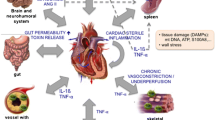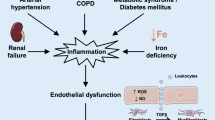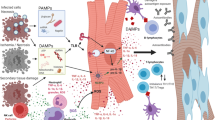Abstract
Heart failure is not a simple defect in the pumping function of cardiac muscle, but rather a complex systemic inflammatory disease affecting many organ systems. Recognition of this fact has led to new therapeutic interventions such as angiotensin-converting enzyme inhibitors and β-blockers, which have a significant impact on the quality of life and survival of patients with heart failure. During the course of heart failure, the steps involved in the activation of inflammation are now better understood. As a result, new therapies will develop that block, modify, or prevent these inflammatory changes, and supplement our armamentarium for providing better and longer lives for patients.
Similar content being viewed by others
References and Recommended Reading
The SOLVD Investigators: Effect of enalapril on mortality and the development of heart failure in asymptomatic patients with reduced left ventricular ejection fractions. N Engl J Med 1992, 327:685–691.
Pfeffer MA, Braunwald E, Moye LA, et al.: Effect of captopril on mortality and morbidity in patients with left ventricular dysfunction after myocardial infarction. Results of the survival and ventricular enlargement trial. The SAVE Investigators. N Engl J Med 1992, 327:669–677.
Eichhorn EF, Bristow MR: The carvedilol prospective randomized cumulative survival (COPERNICUS) trial. Curr Control Trials Cardiovasc Med 2001, 2:20–23.
Torre-Amione G, Kapadia S, Lee J, et al.: Expression and functional significance of tumor necrosis factor receptors in human myocardium. Circulation 1995, 92:1487–1493.
Torre-Amione G, Kapadia S, Lee J, et al.: Tumor necrosis factor-alpha and tumor necrosis factor receptors in the failing human heart. Circulation 1996, 93:704–711.
Torre-Amione G, Kapadia S, Benedict C, et al.: Proinflammatory cytokine levels in patients with depressed left ventricular ejection fraction: a report from the Studies of Left Ventricular Dysfunction (SOLVD). J Am Coll Cardiol 1996, 27:1201–1206.
Bozkurt B, Torre-Amione G, Soram OZ, et al.: Results of a multidose phase I trial with tumor necrosis factor receptor (p75) fusion protein (Entanercept) in patients with heart failure. J Am Coll Cardiol 1999, 34:177–180. One of the first trials utilizing anti-TNF-a therapy in heart failure patients.
Deswal A, Bozkurt B, Seta Y, et al.: Safety and efficacy of a soluble P75 tumor necrosis factor receptor (Enbrel, etanercept) in patients with advanced heart failure. Circulation 1999, 99:3224–3226. Confirms safety of anti-TNF-α therapy in patients with heart failure.
Louis A, Cleland JG, Crabbe S, et al.: Clinical trials update: CAPRICORN, COPERNICUS, MIRACLE, STAF, RITZ-2, RECOVER and RENAISSANCE and cachexia and cholesterol in heart failure. Highlights of the Scientific Sessions of the American College of Cardiology, 2001. Eur J Heart Fail 2001, 3:381–387. Summary and preliminary data on large-scale use of anti-TNF-a therapy.
Torre-Amione G, Stetson SJ, Youker KA, et al.: Decreased expression of tumor necrosis factor-alpha in failing human myocardium after mechanical circulatory support: a potential mechanism for cardiac recovery. Circulation 1999, 100:1189–1193. Original study in which authors demonstrate the importance of volume and pressure overload in TNF-a expression.
Nakano M, Knowlton AA, Dibbs Z, et al.: Tumor necrosis factor-alpha confers resistance to hypoxic injury in the adult mammalian cardiac myocyte. Circulation 1998, 97:1392–1400.
Bryant D, Becker L, Richardson J, et al.: Cardiac failure in transgenic mice with myocardial expression of tumor necrosis factor alpha. Circulation 1998, 97:1375–1381.
Mouthon L, Kaveri SV, Spalter SH, et al.: Mechanisms of action of intravenous immune globulin in immune-mediated diseases. Clin Exp Immunol 1996, 104(Suppl 1):3–9.
McNamara DM, Holubkov R, Starling RC, et al.: Controlled trial of intravenous immune globulin in recent-onset dilated cardiomyopathy. Circulation 2001, 103:2254–2259. Pivotal trial showing no added benefit for IVIG in patients with new onset cardiomyopathy.
Gullestad L, Aass H, Fjeld JG, et al.: Immunomodulating therapy with intravenous immunoglobulin in patients with chronic heart failure. Circulation 2001, 103:220–225. Small trial showing benefit for prolonged administration of IVIG in patients with new-onset cardiomyopathy.
Muller J, Wallukat G, Dandel M, et al.: Immunoglobulin adsorption in patients with idiopathic dilated cardiomyopathy. Circulation 2000, 101:385–391. Small trial showing benefit with immunoadsorption in patients with cardiomyopathy.
Shivji GM, Suzuki H, Mandel AS, et al.: The effects of VAS972 therapy on allergic contact hypersensitivity. J Cutaneous Med Surg 2000, 4:132–137. Use of novel immunomodulating therapy in contact hypersensitivity.
Freed I, Shahid S, Wang B, et al.: Role of transforming growth factor b-1 in the Th1/Th2 mechanisms of Vasogen’s immune modulation therapy: potential role in psoriasis. J Invest Dermatol 2001, 117:388.
Packer M, Carver JR, Rodeheffer RJ, et al.: Effect of oral milrinone on mortality in severe chronic heart failure: the PROMISE Study Research Group. N Engl J Med 1991, 325:1468–1475.
Cohn JN, Goldstein SO, Greenberg BH, et al.: A dose-dependent increase in mortality with vesnarinone among patients with severe heart failure: Vesnarinone Trial Investigators. N Engl J Med 1998, 339:1810–1816.
Packer M, Rouleau J, Swedberg K, et al.: Effect of flosequinan on survival in chronic heart failure: preliminary results of the PROFILE study [abstract]. Circulation 1993, 88(suppl 1):I-301.
Kubo SH, Gollub S, Bourge R, et al.: Beneficial effects of pimobendan on exercise tolerance and quality of life in patients with heart failure: results of a multicenter trial. Circulation 1992, 85:942–949.
Author information
Authors and Affiliations
Rights and permissions
About this article
Cite this article
Lisman, K.A., Stetson, S.J., Koerner, M.M. et al. The role of inflammation in the pathogenesis of heart failure. Curr Cardiol Rep 4, 200–205 (2002). https://doi.org/10.1007/s11886-002-0051-3
Issue Date:
DOI: https://doi.org/10.1007/s11886-002-0051-3




